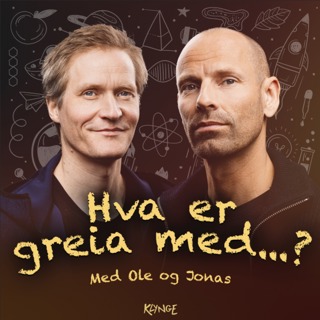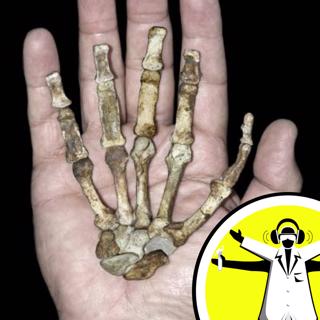
Australopithecus Sediba Special
Reader in evolution at Wits University, Lee Berger, made a life-changing discovery when he uncovered the remains of a new species of hominid, Australopithecus sediba, in South Africa. Here, Chris Smith gets to meet the newest addition to the human family tree... Like this podcast? Please help us by supporting the Naked Scientists
7 Sep 201137min

Why do some animals dump indiscriminately?
Why do some animals poo wherever the fancy takes them, whilst others are more fussy about the locations of their lavatory actions? What triggers pins and needles? How do some fish survive in both fresh and saltwater? And how are new nerve cells born in the adult brain? We burn through your best science questions this week as well as taking a look at Hubble's successor, the James Webb Space Telescope, and hearing how a computer model of a heart can revolutionise cardiac drug design and reviewing the evidence that bacteria were already antibiotic resistant over 30,000 years ago... Like this podcast? Please help us by supporting the Naked Scientists
3 Sep 20111h 6min
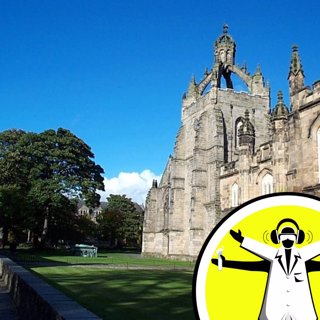
Science in Scotland
This week, Chris explores some of the cutting edge research taking place in Aberdeen. We meet a scientist making new cannabis-like chemicals that lack the side effects of the real thing, talk to a man exploring the deepest part of the Pacific - 7 miles down - to find out what's living there. Plus, thalidomide - 50 years on. Scientists now know why it had the damaging effects it did on unborn babies, but can they make a safe form of the agent so it can be used to treat cancers, leprosy and HIV? Like this podcast? Please help us by supporting the Naked Scientists
27 Aug 201158min

Do planes trigger rains?
The rain in Spain falls mainly on the "plane". Or so the saying goes, but new research has confirmed that aeroplanes do cause clouds to dump their contents prematurely, often around airports, and in this week's show we explore this weather-altering effect of aviation. We also ask industry leader Rolls-Royce to explain how a jet engine works and how their designers have cut noise pollution from planes by over 99% since 1960. In the news, we hear how scientists are forecasting more accurate space weather predictions thanks to a new way to spot sunspots before they even erupt, a new study finds a... Like this podcast? Please help us by supporting the Naked Scientists
20 Aug 20111h 2min
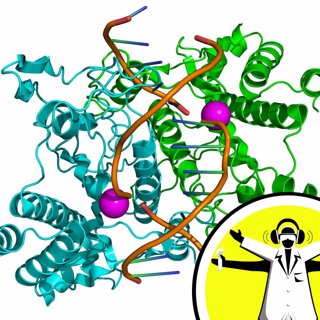
Chemistry By Design
Are designer molecules poised to take us into a new chemical dimension? This week, we explore how, long before the bunsen burner gets lit, computer aided chemistry can enable us to create in silico imaginary new molecules, reactions and designer catalysts. We also delve into how chemicals are manufactured on a massive scale with a visit to a plant making zeolites. And in the news, how hydrogen-metabolising bugs can supercharge deep-sea mussels, how reprogrammed immune system cells can hunt-down cancer, and nature's stock exchange - how plants and fungi develop a subsoil free-market economy... Like this podcast? Please help us by supporting the Naked Scientists
13 Aug 201155min

Do bubbles help washing up?
Do bubbles help or hinder when doing the dishes? Can we find evidence of material from Earth on the Moon? Can camera lenses cause fires? And is fluoride in drinking water safe? In this Question and Answer show, we tackle your science queries, finding out if higher air pressure means louder sounds and if plants from cuttings remain genetically identical over centuries. Plus, launching Lego men to Jupiter, making brain cells from skin cells, and how vampire bats home in on hot blood... Like this podcast? Please help us by supporting the Naked Scientists
6 Aug 201154min
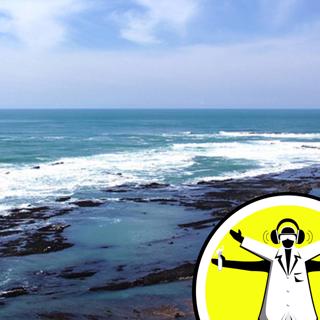
The Year in Ocean Science
This week, we take a dive beneath the waves to look back at the last year in Ocean science. We call in on deep sea microbes, spawning corals and even a seahorse surgery. Plus we hear how the Census of Marine Life all got started and find out about some very strange creatures with sex organs on their heads... Like this podcast? Please help us by supporting the Naked Scientists
30 Jul 201158min

The Year in Astronomy
This week, we look back over the last few months of space science. We'll hear how scientists search for planets in the glare of their parent star, why a simulated mission to Mars will help us to understand how astronauts will cope with isolation, and the challenges of communicating astronomy on television. Plus, what our solar system looks like to a distant observer, and how antique globes tell the story of our understanding. Like this podcast? Please help us by supporting the Naked Scientists
23 Jul 201159min



















